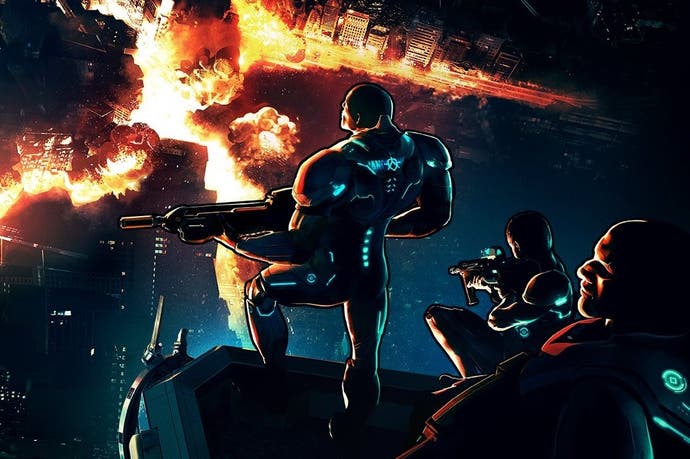Microsoft's confusing Xbox One cloud message shifts to dedicated servers
"Xbox Live is the service. Dedicated servers is the benefit."
Microsoft's E3 2014 press conference was notable for its focus on games, but one Xbox One feature, touted when the console was revealed last year as one of its unique selling points, was conspicuous by its absence.
There was not one mention of "the cloud" during Microsoft's 90 minute presentation, either from Xbox boss Phil Spencer or the many developers that took to the stage to talk about their games.
Instead, we heard the term "dedicated servers" over and over again. This after Microsoft spent a great deal of time and effort insisting the power of the cloud would revolutionise gaming as we know it.
I remember attending a behind closed doors presentation on the power of the cloud during last year's E3, and listening to Microsoft engineering manager Jeff Henshaw tell a small gathering of journalists that Xbox One's 300,000 server cloud gave the next generation console a unique advantage. Developers could, Microsoft said, offload complex CPU work to the cloud, resulting in more impressive games - in theory.
The problem was, no-one really understood what the cloud meant, exactly, or how it would improve games on Xbox One, save for Forza 5 having AI with "human intelligence". It was a confusing, abstract message muddied further by the term itself: the cloud, a marketing slogan without substance.
In the end it was Titanfall developer Respawn, via a blog post, that explained the benefit of the Xbox One cloud best - and even then it was hard to wrap your head around exactly how it worked.
Now Titanfall has released, the power of the cloud seems to have been something of a damp squib. It seems the cloud, in the short term at least, is about dedicated servers and how they make multiplayer gaming more seamless.
And that - finally - is how Microsoft is now referring to the cloud.
"You picked up on exactly that," Phil Harrison told me at E3 last week.
"Xbox Live is the service. Dedicated servers is the benefit. That is the reason why these games are going to be better, why the experience for multiplayer is going to be better.
"And we're being clear, hopefully around all of the games that will take advantage of it, whether it is a game like Forza Horizon 2, or whether it's Halo: The Master Chief Collection, particularly the Halo 5: Guardians multiplayer beta."
So what does this mean for Xbox One games? Dedicated servers was mentioned in relation to a raft of upcoming Xbox One exclusives, including racing game Forza Horizon 2, from UK studio Playground Games, Insomniac Games' Sunset Overdrive with its eight-player multiplayer, Halo: The Master Chief Collection's nostalgia-fuelled multiplayer, Lionhead's Fable: Legends with its four versus one multiplayer, and Crackdown, from Dave Jones and his mystery team, which features open world co-op.
All these games will benefit from dedicated servers. But what about the true power of the cloud as Microsoft described it one year ago?
It turns out the new Crackdown, which will surely lean heavily on co-op play, was shown off before E3 via a demo created for Microsoft's developer-focused Build 2014 conference.
Xbox boss Phil Spencer confirmed on Twitter that the video, below, features early Crackdown work. It shows how the cloud can make the destruction of a building, for example, faster and smoother. The fancy Crackdown trailer shown off at E3 last week also featured a building being destroyed.
"Xbox Live is the service. Dedicated servers is the benefit. That is the reason why these games are going to be better, why the experience for multiplayer is going to be better."
Microsoft Studios executive Phil Harrison
Crackdown indicates that while Microsoft's messaging behind the cloud has shifted in the short term, it's sticking to its long term vision for how it could benefit games.
Digital Foundry's Richard Leadbetter welcomed Microsoft's more approachable messaging, but said important questions remain.
"The name might have changed, but this is still very much the Azure 'Thunderhead' service, just with a name-change to make it more appealing to the core gamer," Leadbetter said. "While the cloud obviously offers dedicated server functionality, Azure offers the potential for much more and it doesn't look as though Microsoft has changed its plans there.
"We've only seen a hint of what's possible so far beyond multiplayer gaming with Drivatars and Titanfall's grunt AI. The Crackdown prototype is a great example of what the cloud should excel at - offloading complex calculations away from the host console, where the additional 100ms or so latency to and from the datacentre won't unduly impact gameplay.
"The cloud doesn't address graphics bottlenecks, but here it demonstrates how much of a strain simulating destruction of a complex scene can have on the CPU - an area where both PS4 and Xbox One lag behind even mid-range PC processors.
"The question is really how much CPU time Microsoft is willing to dedicate to each game instance. I suspect that the Crackdown prototype uses an order of magnitude more CPU power than, say, the grunt AI in Titanfall. It'll be an interesting stress test of the Azure infrastructure to see if it can hold its own in a game likely to break the million-sales barrier in short order."




.jpg?width=291&height=164&fit=crop&quality=80&format=jpg&auto=webp)





